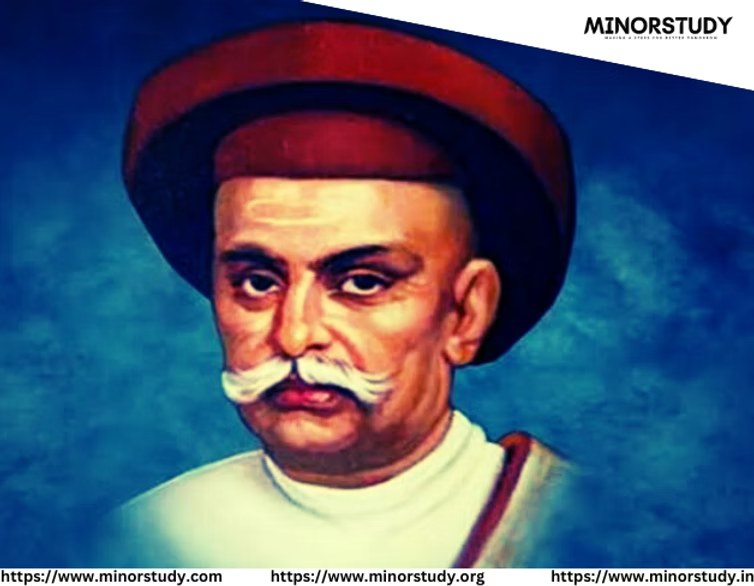Mahadev Govind Ranade – The Visionary Reformer Who Lit the Path of Modern India
Mahadev Govind Ranade: In the grand tapestry of India’s socio-political evolution, few names shine as brightly as Mahadev Govind Ranade. Revered as a social reformer, freedom thinker, judge, and historian, Ranade was a man ahead of his time. He believed in change through constitutional methods, dialogue, education, and moral reform—not conflict.
- Mahadev Govind Ranade – The Visionary Reformer Who Lit the Path of Modern India
- 📜 History and Early Life of Mahadev Govind Ranade
- 📅 Timeline of Mahadev Govind Ranade’s Life and Achievements
- 📊 Incredible Facts About Mahadev Govind Ranade
- 📚 Ideological Significance of Mahadev Govind Ranade
- 🏛 1. Religious Reform
- 👩🎓 2. Women Empowerment
- 🧑⚖️ 3. Judicial Integrity
- 💹 4. Economic Vision
- 🕊 5. Moderate Nationalism
- 🎯 Why Mahadev Govind Ranade’s Legacy Matters in Today’s Life
- 🧠 1. Education First
- 🧘♂️ 2. Spiritual Modernism
- 👥 3. Social Unity
- 🧑🌾 4. Rural Development
- 🧑⚖️ 5. Moral Leadership
- 🙏 Observance & Ways to Remember Him
- 💌 Heartfelt Wishing Messages for Mahadev Govind Ranade Jayanti
- 🧠 Frequently Asked Questions (FAQs)
- ❓ Who was Mahadev Govind Ranade?
- ❓ What was Ranade’s profession?
- ❓ What were his major contributions?
- ❓ Who were his close associates?
- ❓ What organizations did he help build?
- 🧭 Conclusion: Daily Life Impact and Societal Importance
- 📌 Key Takeaways
- 🌟 Final Thought
At a time when blind orthodoxy dominated and colonial rule cast its long shadow, Ranade’s vision was clear: social justice, economic upliftment, and spiritual tolerance.
📜 History and Early Life of Mahadev Govind Ranade
Mahadev Govind Ranade was born on January 18, 1842, in Niphad, Maharashtra (then part of the Bombay Presidency). Raised in a Chitpavan Brahmin family, he received a traditional Sanskrit education but soon moved to English schooling—an unusual step in that era.
He studied at Elphinstone College, Mumbai, where he was heavily influenced by the ideals of the British Enlightenment and Indian reformers like Raja Ram Mohan Roy. In 1866, he became one of the first Indian judges to serve in the Bombay High Court.
📅 Timeline of Mahadev Govind Ranade’s Life and Achievements
| Year | Event |
|---|---|
| 1842 | Born in Niphad, Maharashtra. |
| 1862 | Graduated in law from Elphinstone College. |
| 1867 | Co-founded the Poona Sarvajanik Sabha, a precursor to the Indian National Congress. |
| 1870s | Promoted social reforms on widow remarriage, women’s education, and child marriage. |
| 1885 | Active supporter during the founding of the Indian National Congress. |
| 1887 | Appointed as Judge of Bombay High Court. |
| 1890s | Published works on Indian economics and social structure. |
| 1901 | Passed away on January 16, leaving a legacy of reform and tolerance. |
📊 Incredible Facts About Mahadev Govind Ranade
He was known as the “Rajarshi”—a spiritual sage in public life.
Ranade was a co-founder of the Indian National Congress.
He refused to remarry after his first wife’s death until the bride’s family agreed to educate her.
He was one of the early advocates of economic self-reliance and indigenous industry.
He supported the Deccan Agricultural Relief Act, aiming to address farmer exploitation.
His famous quote: “Religious reform must precede political reform.”
He mentored social reformers like Gopal Krishna Gokhale, who in turn mentored Mahatma Gandhi.
He was associated with the Prarthana Samaj, advocating universal theism and social reform.
📚 Ideological Significance of Mahadev Govind Ranade
Ranade was not just a social reformer; he was a visionary whose principles still resonate in modern India.
🏛 1. Religious Reform
He promoted a rational and inclusive approach to Hinduism, challenging caste rigidity and ritualism.
👩🎓 2. Women Empowerment
Ranade firmly believed in educating women, widow remarriage, and opposing child marriage—radical views for his time.
🧑⚖️ 3. Judicial Integrity
As a High Court Judge, he was known for his uncompromising moral standards, combining compassion with justice.
💹 4. Economic Vision
He opposed British economic policies that drained Indian wealth and encouraged local enterprise, banking, and industrialization.
🕊 5. Moderate Nationalism
Ranade’s method was non-confrontational. He promoted dialogue and constitutional rights, influencing future Gandhian philosophy.
🎯 Why Mahadev Govind Ranade’s Legacy Matters in Today’s Life
🧠 1. Education First
His emphasis on education, especially female literacy, remains a cornerstone of India’s development plans today.
🧘♂️ 2. Spiritual Modernism
In a time of rising extremism, Ranade’s balanced spirituality and logic-based religion offer a peaceful path.
👥 3. Social Unity
His teachings support inclusivity and empathy, essential in a pluralistic democracy like India.
🧑🌾 4. Rural Development
His ideas on rural banking, farmer welfare, and local industry are echoed in today’s policies like “Vocal for Local” and PM-Kisan.
🧑⚖️ 5. Moral Leadership
In a world full of quick fixes and noise, Ranade’s life reminds us of ethical reform through intellect and integrity.
🙏 Observance & Ways to Remember Him
Though not a national holiday, January 18 is often observed in educational and social circles through:
Lectures and seminars on constitutional and social reform.
Memorial services and writings by historians.
Academic competitions on social justice and Indian philosophy.
Discussions in law colleges and public forums.
💌 Heartfelt Wishing Messages for Mahadev Govind Ranade Jayanti
Want to express gratitude or awareness on his birth anniversary? Here are some warm wishes:
🕊 “Let us celebrate the legacy of truth, justice, and intellect—Happy Mahadev Govind Ranade Jayanti!”
📘 “Remembering a scholar, a sage, and a true reformer who shaped India’s soul.”
🧠 “May we carry forward his legacy of reform, reason, and righteousness.”
🇮🇳 “A silent warrior of India’s social awakening—Salute to Mahadev Govind Ranade.”
🧠 Frequently Asked Questions (FAQs)
❓ Who was Mahadev Govind Ranade?
He was an Indian scholar, judge, social reformer, and co-founder of the Indian National Congress, known for promoting women’s education, widow remarriage, and economic reform.
❓ What was Ranade’s profession?
He served as a judge in the Bombay High Court and was also a historian and author.
❓ What were his major contributions?
Legal reform
Founding the Prarthana Samaj
Economic policies for India’s self-reliance
Advocating women’s rights and education
❓ Who were his close associates?
Gopal Krishna Gokhale (his student)
R. G. Bhandarkar, reformist scholar
Justice M. G. Telang
❓ What organizations did he help build?
Poona Sarvajanik Sabha
Prarthana Samaj
Indian National Congress
🧭 Conclusion: Daily Life Impact and Societal Importance
Mahadev Govind Ranade’s life teaches us that progress and tradition can coexist, and truth doesn’t need noise to be powerful.
In everyday life, we:
Uphold fairness and reason—echoing his legal legacy.
Promote education and equality—carrying forward his fight for women’s rights.
Support local industries and rural upliftment—living his economic ideals.
Seek dialogue over division—a hallmark of his political approach.
In a fast-moving world, his calm, thoughtful leadership is a beacon. His belief in reform through intellect, not uproar, remains more relevant than ever.
📌 Key Takeaways
Born: January 18, 1842 | Died: January 16, 1901
Profession: Judge, Economist, Reformer
Key Movements: Widow remarriage, Female education, Economic reform
Known For: Founding Indian National Congress, mentoring Gokhale
Legacy: A life of ethical leadership and social vision
🌟 Final Thought
Let us not merely remember Mahadev Govind Ranade on his birth anniversary. Let’s live his legacy by fostering rational thought, social unity, gender equality, and fearless truth in our homes, schools, and society.
His wisdom continues to whisper: True reform begins within. 🕊









Very interesting info!Perfect just what I was looking for!